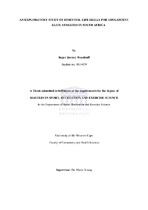| dc.description.abstract | Pursuing a career as a professional athlete has become a viable option for talented athletes to pursue. However, in their pursuit of athletic excellence many athletes neglect their academic, work and post sport career planning. To help athletes with participation, educational, development and lifestyle issues many countries have developed athlete assistance programs. To achieve the objective of a Winning Nation and help talented South African athletes develop and perform at a higher level the South African Sports Confederation and Olympic Committee (SASCOC) plans to establish a national academy system. The role of the academy system is to assist in addressing the demographics of the national teams by accelerating the development of talented athletes particularly those from the disadvantaged groups. To ensure that a holistic approach is taken towards athlete development one of the services that will be provided is life skills training. To develop a successful life skills program, it is essential to identify the important life skills to include.
Aim
The aim of the study was to explore and identify the life skills necessary for inclusion in Life Skills programs in South African elite sport focusing on the development of adolescent athletes to enable them to grow up competent, healthy and reach their full potential.
Design
A pure qualitative research design was employed using thematic analysis. Data was analysed through the lens of Positive Youth Development (PYD) theory. Moreover, a semi-structured interview guide, consisting of open ended questions, was developed utilizing the 5 C’s of PYD as themes to facilitate the interview process. Nine current adolescent elite South African athletes, on the MacSteel Maestro’s program, participated in the study. A purposive sampling procedure informed the sampling process and a thematic coding framework was developed to analyse the interview data.
Results
Findings of the research provided a contribution to the literature in two ways. First, it provided a South African perspective of the life skills needed by elite adolescent athletes. Secondly, it identified the life skills elite adolescent South African athletes deemed important for their holistic development to include in life skills programs in South African elite sport. Time management and self - esteem / self – confidence skills were identified as the crucial life skills to be developed.
Conclusion
In general it can be concluded that the participants have benefitted from being on the MMP, and that the participants exhibited characteristics of competence, confidence, character, connection and caring / compassion both in and out of sport. | en_US |

